Analysis of Recovery Approach in Mental Health Nursing Case Study
VerifiedAdded on 2023/05/28
|8
|2929
|59
Case Study
AI Summary
This assignment presents a comprehensive case study analysis within the context of mental health nursing, focusing on the application and challenges of the recovery approach. It critically evaluates the recovery process for a patient named Annabelle, highlighting the difficulties in establishing a therapeutic relationship, ensuring medication adherence, and addressing her specific needs due to her uncooperative attitude and symptoms like hallucinations. The analysis extends to the issues encountered during the mental state examination (MSE), particularly concerning appearance, behavior, speech, mood, thought processes, insight, and judgment. Furthermore, the study identifies broader issues within mental health care, such as diagnostic challenges, societal stigma, and the necessity for integrated, multi-factorial treatment approaches. The assignment concludes by emphasizing the importance of addressing both pharmacological and non-pharmacological treatment aspects, as well as the crucial role of societal support in the recovery of individuals with mental illness. Desklib offers a variety of similar solved assignments and resources for students.
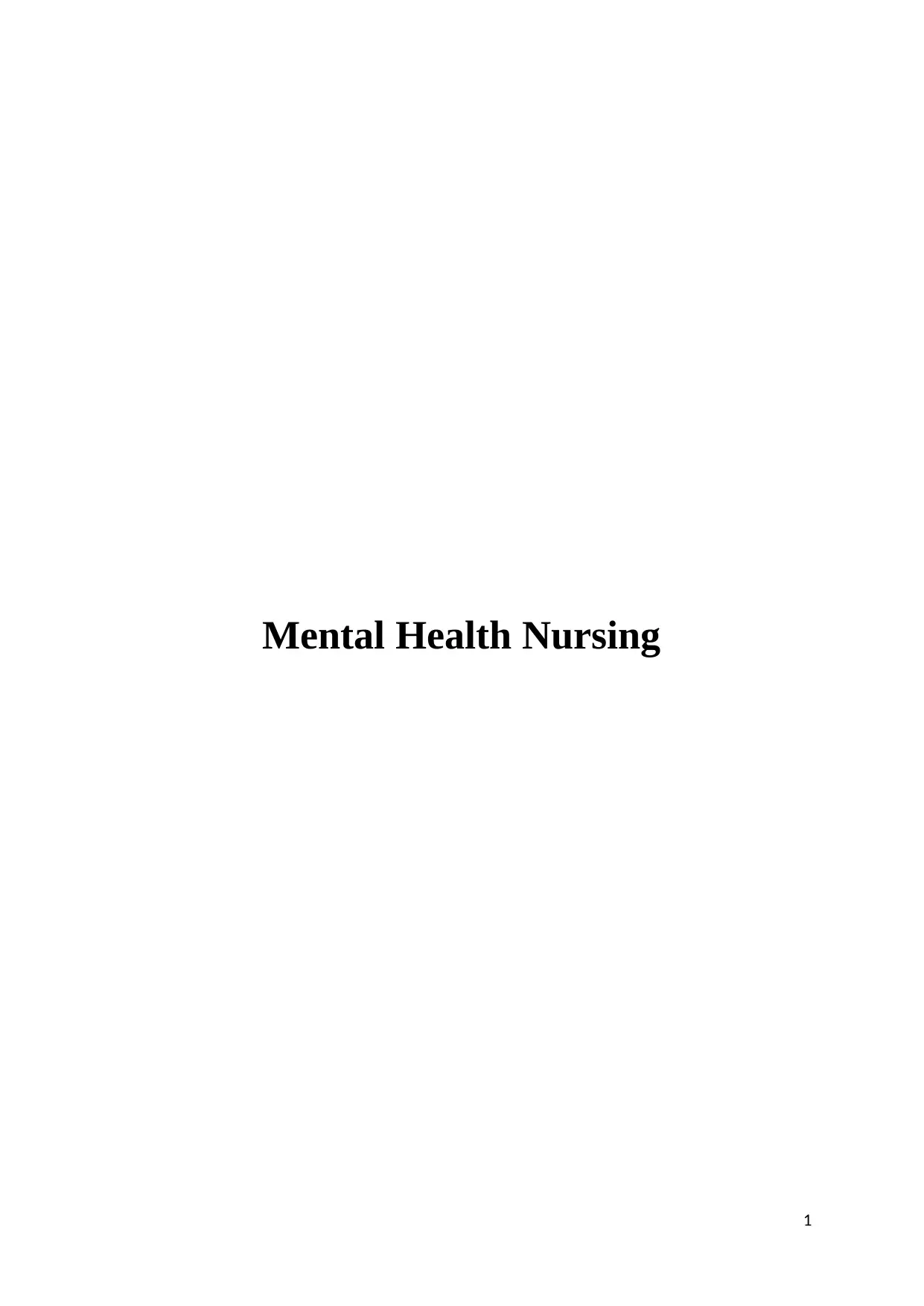
Mental Health Nursing
1
1
Paraphrase This Document
Need a fresh take? Get an instant paraphrase of this document with our AI Paraphraser
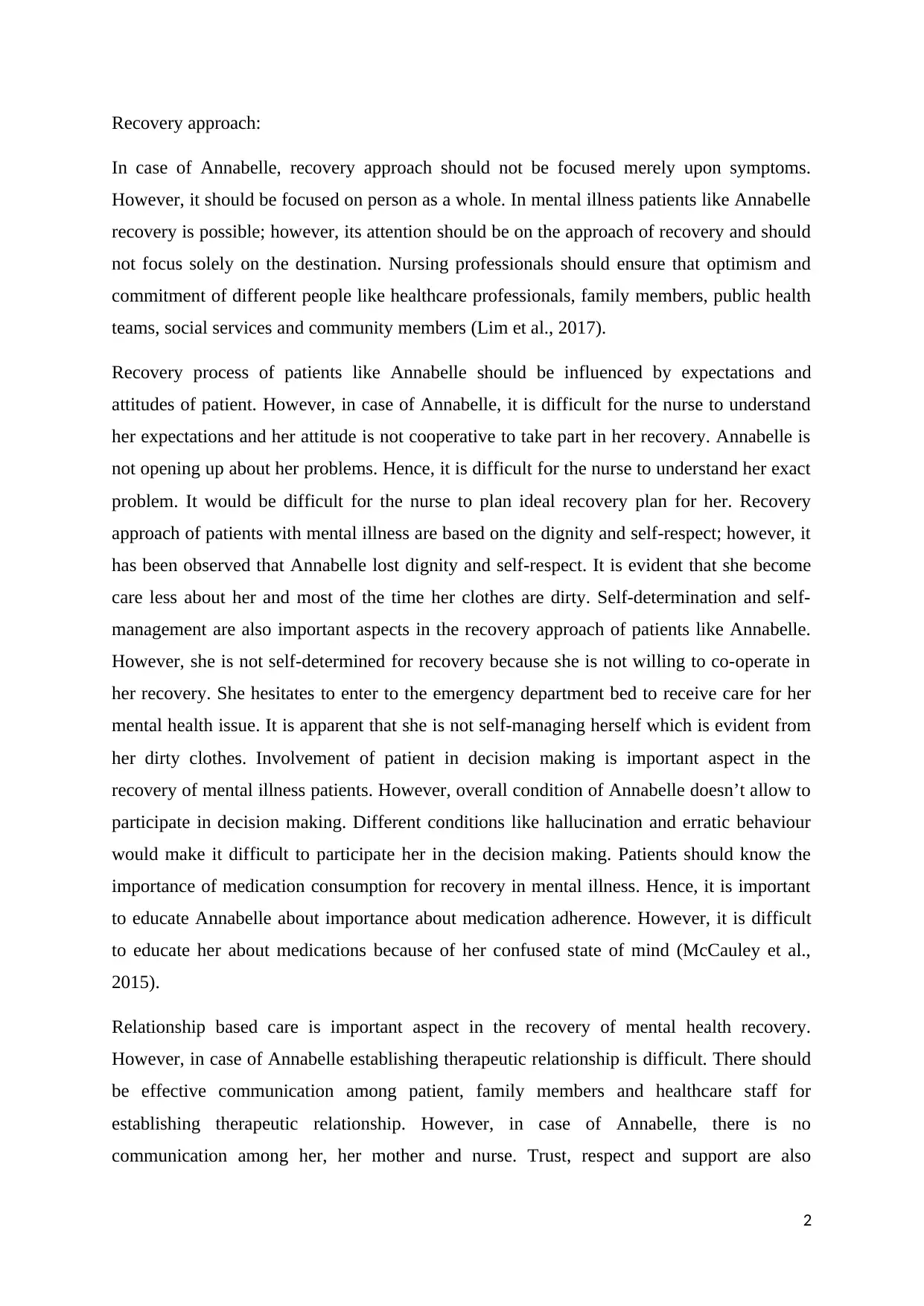
Recovery approach:
In case of Annabelle, recovery approach should not be focused merely upon symptoms.
However, it should be focused on person as a whole. In mental illness patients like Annabelle
recovery is possible; however, its attention should be on the approach of recovery and should
not focus solely on the destination. Nursing professionals should ensure that optimism and
commitment of different people like healthcare professionals, family members, public health
teams, social services and community members (Lim et al., 2017).
Recovery process of patients like Annabelle should be influenced by expectations and
attitudes of patient. However, in case of Annabelle, it is difficult for the nurse to understand
her expectations and her attitude is not cooperative to take part in her recovery. Annabelle is
not opening up about her problems. Hence, it is difficult for the nurse to understand her exact
problem. It would be difficult for the nurse to plan ideal recovery plan for her. Recovery
approach of patients with mental illness are based on the dignity and self-respect; however, it
has been observed that Annabelle lost dignity and self-respect. It is evident that she become
care less about her and most of the time her clothes are dirty. Self-determination and self-
management are also important aspects in the recovery approach of patients like Annabelle.
However, she is not self-determined for recovery because she is not willing to co-operate in
her recovery. She hesitates to enter to the emergency department bed to receive care for her
mental health issue. It is apparent that she is not self-managing herself which is evident from
her dirty clothes. Involvement of patient in decision making is important aspect in the
recovery of mental illness patients. However, overall condition of Annabelle doesn’t allow to
participate in decision making. Different conditions like hallucination and erratic behaviour
would make it difficult to participate her in the decision making. Patients should know the
importance of medication consumption for recovery in mental illness. Hence, it is important
to educate Annabelle about importance about medication adherence. However, it is difficult
to educate her about medications because of her confused state of mind (McCauley et al.,
2015).
Relationship based care is important aspect in the recovery of mental health recovery.
However, in case of Annabelle establishing therapeutic relationship is difficult. There should
be effective communication among patient, family members and healthcare staff for
establishing therapeutic relationship. However, in case of Annabelle, there is no
communication among her, her mother and nurse. Trust, respect and support are also
2
In case of Annabelle, recovery approach should not be focused merely upon symptoms.
However, it should be focused on person as a whole. In mental illness patients like Annabelle
recovery is possible; however, its attention should be on the approach of recovery and should
not focus solely on the destination. Nursing professionals should ensure that optimism and
commitment of different people like healthcare professionals, family members, public health
teams, social services and community members (Lim et al., 2017).
Recovery process of patients like Annabelle should be influenced by expectations and
attitudes of patient. However, in case of Annabelle, it is difficult for the nurse to understand
her expectations and her attitude is not cooperative to take part in her recovery. Annabelle is
not opening up about her problems. Hence, it is difficult for the nurse to understand her exact
problem. It would be difficult for the nurse to plan ideal recovery plan for her. Recovery
approach of patients with mental illness are based on the dignity and self-respect; however, it
has been observed that Annabelle lost dignity and self-respect. It is evident that she become
care less about her and most of the time her clothes are dirty. Self-determination and self-
management are also important aspects in the recovery approach of patients like Annabelle.
However, she is not self-determined for recovery because she is not willing to co-operate in
her recovery. She hesitates to enter to the emergency department bed to receive care for her
mental health issue. It is apparent that she is not self-managing herself which is evident from
her dirty clothes. Involvement of patient in decision making is important aspect in the
recovery of mental illness patients. However, overall condition of Annabelle doesn’t allow to
participate in decision making. Different conditions like hallucination and erratic behaviour
would make it difficult to participate her in the decision making. Patients should know the
importance of medication consumption for recovery in mental illness. Hence, it is important
to educate Annabelle about importance about medication adherence. However, it is difficult
to educate her about medications because of her confused state of mind (McCauley et al.,
2015).
Relationship based care is important aspect in the recovery of mental health recovery.
However, in case of Annabelle establishing therapeutic relationship is difficult. There should
be effective communication among patient, family members and healthcare staff for
establishing therapeutic relationship. However, in case of Annabelle, there is no
communication among her, her mother and nurse. Trust, respect and support are also
2
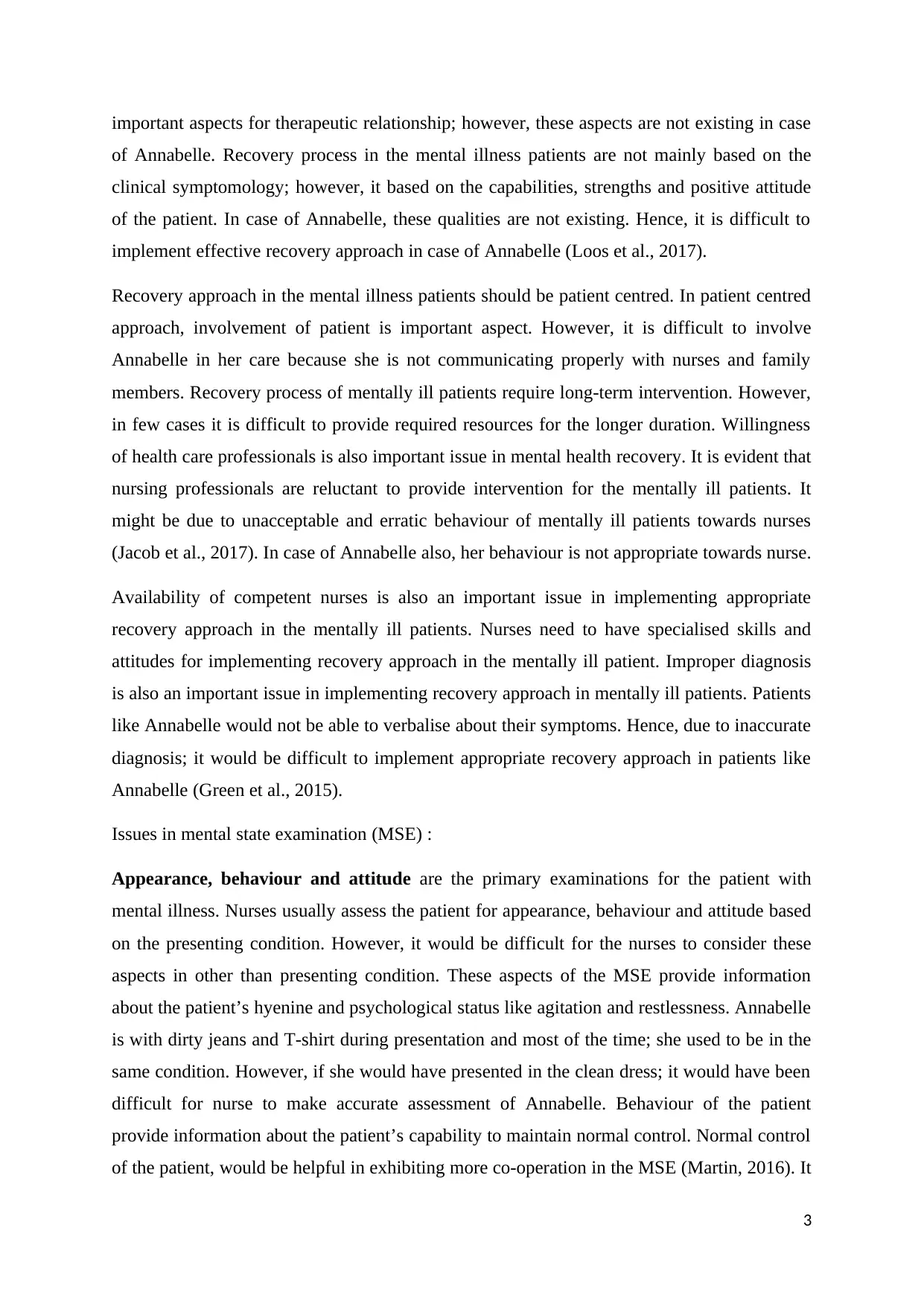
important aspects for therapeutic relationship; however, these aspects are not existing in case
of Annabelle. Recovery process in the mental illness patients are not mainly based on the
clinical symptomology; however, it based on the capabilities, strengths and positive attitude
of the patient. In case of Annabelle, these qualities are not existing. Hence, it is difficult to
implement effective recovery approach in case of Annabelle (Loos et al., 2017).
Recovery approach in the mental illness patients should be patient centred. In patient centred
approach, involvement of patient is important aspect. However, it is difficult to involve
Annabelle in her care because she is not communicating properly with nurses and family
members. Recovery process of mentally ill patients require long-term intervention. However,
in few cases it is difficult to provide required resources for the longer duration. Willingness
of health care professionals is also important issue in mental health recovery. It is evident that
nursing professionals are reluctant to provide intervention for the mentally ill patients. It
might be due to unacceptable and erratic behaviour of mentally ill patients towards nurses
(Jacob et al., 2017). In case of Annabelle also, her behaviour is not appropriate towards nurse.
Availability of competent nurses is also an important issue in implementing appropriate
recovery approach in the mentally ill patients. Nurses need to have specialised skills and
attitudes for implementing recovery approach in the mentally ill patient. Improper diagnosis
is also an important issue in implementing recovery approach in mentally ill patients. Patients
like Annabelle would not be able to verbalise about their symptoms. Hence, due to inaccurate
diagnosis; it would be difficult to implement appropriate recovery approach in patients like
Annabelle (Green et al., 2015).
Issues in mental state examination (MSE) :
Appearance, behaviour and attitude are the primary examinations for the patient with
mental illness. Nurses usually assess the patient for appearance, behaviour and attitude based
on the presenting condition. However, it would be difficult for the nurses to consider these
aspects in other than presenting condition. These aspects of the MSE provide information
about the patient’s hyenine and psychological status like agitation and restlessness. Annabelle
is with dirty jeans and T-shirt during presentation and most of the time; she used to be in the
same condition. However, if she would have presented in the clean dress; it would have been
difficult for nurse to make accurate assessment of Annabelle. Behaviour of the patient
provide information about the patient’s capability to maintain normal control. Normal control
of the patient, would be helpful in exhibiting more co-operation in the MSE (Martin, 2016). It
3
of Annabelle. Recovery process in the mental illness patients are not mainly based on the
clinical symptomology; however, it based on the capabilities, strengths and positive attitude
of the patient. In case of Annabelle, these qualities are not existing. Hence, it is difficult to
implement effective recovery approach in case of Annabelle (Loos et al., 2017).
Recovery approach in the mental illness patients should be patient centred. In patient centred
approach, involvement of patient is important aspect. However, it is difficult to involve
Annabelle in her care because she is not communicating properly with nurses and family
members. Recovery process of mentally ill patients require long-term intervention. However,
in few cases it is difficult to provide required resources for the longer duration. Willingness
of health care professionals is also important issue in mental health recovery. It is evident that
nursing professionals are reluctant to provide intervention for the mentally ill patients. It
might be due to unacceptable and erratic behaviour of mentally ill patients towards nurses
(Jacob et al., 2017). In case of Annabelle also, her behaviour is not appropriate towards nurse.
Availability of competent nurses is also an important issue in implementing appropriate
recovery approach in the mentally ill patients. Nurses need to have specialised skills and
attitudes for implementing recovery approach in the mentally ill patient. Improper diagnosis
is also an important issue in implementing recovery approach in mentally ill patients. Patients
like Annabelle would not be able to verbalise about their symptoms. Hence, due to inaccurate
diagnosis; it would be difficult to implement appropriate recovery approach in patients like
Annabelle (Green et al., 2015).
Issues in mental state examination (MSE) :
Appearance, behaviour and attitude are the primary examinations for the patient with
mental illness. Nurses usually assess the patient for appearance, behaviour and attitude based
on the presenting condition. However, it would be difficult for the nurses to consider these
aspects in other than presenting condition. These aspects of the MSE provide information
about the patient’s hyenine and psychological status like agitation and restlessness. Annabelle
is with dirty jeans and T-shirt during presentation and most of the time; she used to be in the
same condition. However, if she would have presented in the clean dress; it would have been
difficult for nurse to make accurate assessment of Annabelle. Behaviour of the patient
provide information about the patient’s capability to maintain normal control. Normal control
of the patient, would be helpful in exhibiting more co-operation in the MSE (Martin, 2016). It
3
⊘ This is a preview!⊘
Do you want full access?
Subscribe today to unlock all pages.

Trusted by 1+ million students worldwide
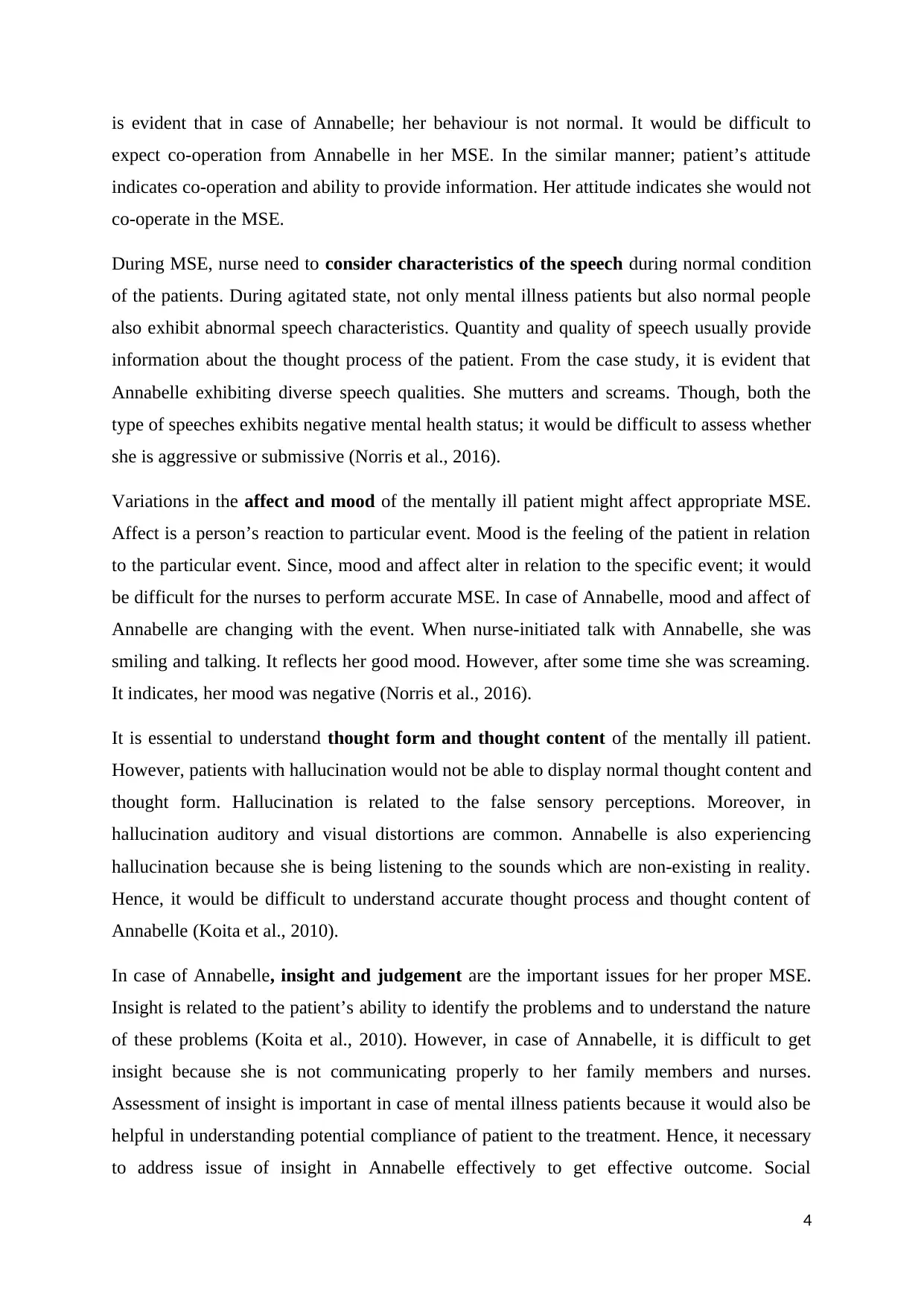
is evident that in case of Annabelle; her behaviour is not normal. It would be difficult to
expect co-operation from Annabelle in her MSE. In the similar manner; patient’s attitude
indicates co-operation and ability to provide information. Her attitude indicates she would not
co-operate in the MSE.
During MSE, nurse need to consider characteristics of the speech during normal condition
of the patients. During agitated state, not only mental illness patients but also normal people
also exhibit abnormal speech characteristics. Quantity and quality of speech usually provide
information about the thought process of the patient. From the case study, it is evident that
Annabelle exhibiting diverse speech qualities. She mutters and screams. Though, both the
type of speeches exhibits negative mental health status; it would be difficult to assess whether
she is aggressive or submissive (Norris et al., 2016).
Variations in the affect and mood of the mentally ill patient might affect appropriate MSE.
Affect is a person’s reaction to particular event. Mood is the feeling of the patient in relation
to the particular event. Since, mood and affect alter in relation to the specific event; it would
be difficult for the nurses to perform accurate MSE. In case of Annabelle, mood and affect of
Annabelle are changing with the event. When nurse-initiated talk with Annabelle, she was
smiling and talking. It reflects her good mood. However, after some time she was screaming.
It indicates, her mood was negative (Norris et al., 2016).
It is essential to understand thought form and thought content of the mentally ill patient.
However, patients with hallucination would not be able to display normal thought content and
thought form. Hallucination is related to the false sensory perceptions. Moreover, in
hallucination auditory and visual distortions are common. Annabelle is also experiencing
hallucination because she is being listening to the sounds which are non-existing in reality.
Hence, it would be difficult to understand accurate thought process and thought content of
Annabelle (Koita et al., 2010).
In case of Annabelle, insight and judgement are the important issues for her proper MSE.
Insight is related to the patient’s ability to identify the problems and to understand the nature
of these problems (Koita et al., 2010). However, in case of Annabelle, it is difficult to get
insight because she is not communicating properly to her family members and nurses.
Assessment of insight is important in case of mental illness patients because it would also be
helpful in understanding potential compliance of patient to the treatment. Hence, it necessary
to address issue of insight in Annabelle effectively to get effective outcome. Social
4
expect co-operation from Annabelle in her MSE. In the similar manner; patient’s attitude
indicates co-operation and ability to provide information. Her attitude indicates she would not
co-operate in the MSE.
During MSE, nurse need to consider characteristics of the speech during normal condition
of the patients. During agitated state, not only mental illness patients but also normal people
also exhibit abnormal speech characteristics. Quantity and quality of speech usually provide
information about the thought process of the patient. From the case study, it is evident that
Annabelle exhibiting diverse speech qualities. She mutters and screams. Though, both the
type of speeches exhibits negative mental health status; it would be difficult to assess whether
she is aggressive or submissive (Norris et al., 2016).
Variations in the affect and mood of the mentally ill patient might affect appropriate MSE.
Affect is a person’s reaction to particular event. Mood is the feeling of the patient in relation
to the particular event. Since, mood and affect alter in relation to the specific event; it would
be difficult for the nurses to perform accurate MSE. In case of Annabelle, mood and affect of
Annabelle are changing with the event. When nurse-initiated talk with Annabelle, she was
smiling and talking. It reflects her good mood. However, after some time she was screaming.
It indicates, her mood was negative (Norris et al., 2016).
It is essential to understand thought form and thought content of the mentally ill patient.
However, patients with hallucination would not be able to display normal thought content and
thought form. Hallucination is related to the false sensory perceptions. Moreover, in
hallucination auditory and visual distortions are common. Annabelle is also experiencing
hallucination because she is being listening to the sounds which are non-existing in reality.
Hence, it would be difficult to understand accurate thought process and thought content of
Annabelle (Koita et al., 2010).
In case of Annabelle, insight and judgement are the important issues for her proper MSE.
Insight is related to the patient’s ability to identify the problems and to understand the nature
of these problems (Koita et al., 2010). However, in case of Annabelle, it is difficult to get
insight because she is not communicating properly to her family members and nurses.
Assessment of insight is important in case of mental illness patients because it would also be
helpful in understanding potential compliance of patient to the treatment. Hence, it necessary
to address issue of insight in Annabelle effectively to get effective outcome. Social
4
Paraphrase This Document
Need a fresh take? Get an instant paraphrase of this document with our AI Paraphraser
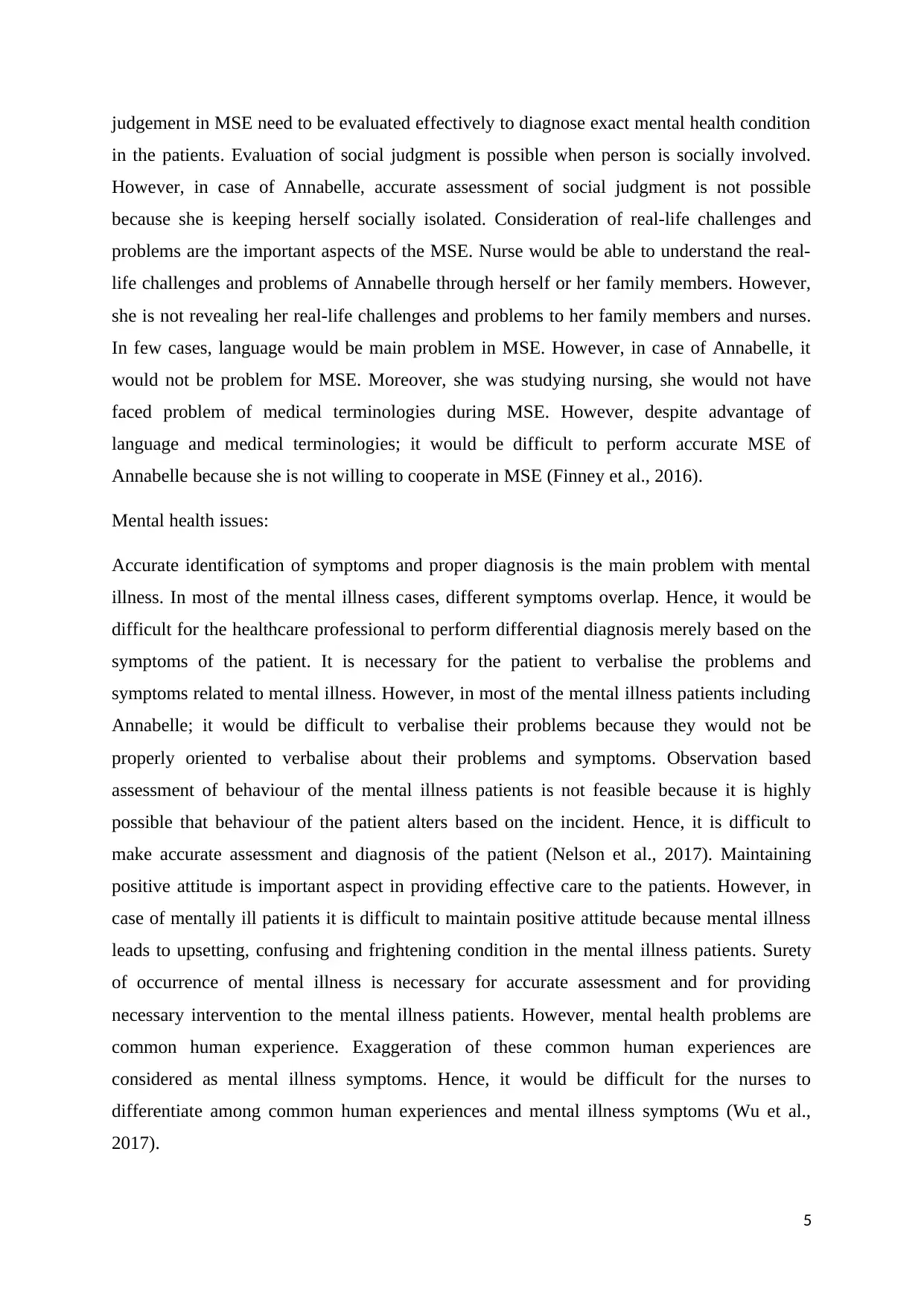
judgement in MSE need to be evaluated effectively to diagnose exact mental health condition
in the patients. Evaluation of social judgment is possible when person is socially involved.
However, in case of Annabelle, accurate assessment of social judgment is not possible
because she is keeping herself socially isolated. Consideration of real-life challenges and
problems are the important aspects of the MSE. Nurse would be able to understand the real-
life challenges and problems of Annabelle through herself or her family members. However,
she is not revealing her real-life challenges and problems to her family members and nurses.
In few cases, language would be main problem in MSE. However, in case of Annabelle, it
would not be problem for MSE. Moreover, she was studying nursing, she would not have
faced problem of medical terminologies during MSE. However, despite advantage of
language and medical terminologies; it would be difficult to perform accurate MSE of
Annabelle because she is not willing to cooperate in MSE (Finney et al., 2016).
Mental health issues:
Accurate identification of symptoms and proper diagnosis is the main problem with mental
illness. In most of the mental illness cases, different symptoms overlap. Hence, it would be
difficult for the healthcare professional to perform differential diagnosis merely based on the
symptoms of the patient. It is necessary for the patient to verbalise the problems and
symptoms related to mental illness. However, in most of the mental illness patients including
Annabelle; it would be difficult to verbalise their problems because they would not be
properly oriented to verbalise about their problems and symptoms. Observation based
assessment of behaviour of the mental illness patients is not feasible because it is highly
possible that behaviour of the patient alters based on the incident. Hence, it is difficult to
make accurate assessment and diagnosis of the patient (Nelson et al., 2017). Maintaining
positive attitude is important aspect in providing effective care to the patients. However, in
case of mentally ill patients it is difficult to maintain positive attitude because mental illness
leads to upsetting, confusing and frightening condition in the mental illness patients. Surety
of occurrence of mental illness is necessary for accurate assessment and for providing
necessary intervention to the mental illness patients. However, mental health problems are
common human experience. Exaggeration of these common human experiences are
considered as mental illness symptoms. Hence, it would be difficult for the nurses to
differentiate among common human experiences and mental illness symptoms (Wu et al.,
2017).
5
in the patients. Evaluation of social judgment is possible when person is socially involved.
However, in case of Annabelle, accurate assessment of social judgment is not possible
because she is keeping herself socially isolated. Consideration of real-life challenges and
problems are the important aspects of the MSE. Nurse would be able to understand the real-
life challenges and problems of Annabelle through herself or her family members. However,
she is not revealing her real-life challenges and problems to her family members and nurses.
In few cases, language would be main problem in MSE. However, in case of Annabelle, it
would not be problem for MSE. Moreover, she was studying nursing, she would not have
faced problem of medical terminologies during MSE. However, despite advantage of
language and medical terminologies; it would be difficult to perform accurate MSE of
Annabelle because she is not willing to cooperate in MSE (Finney et al., 2016).
Mental health issues:
Accurate identification of symptoms and proper diagnosis is the main problem with mental
illness. In most of the mental illness cases, different symptoms overlap. Hence, it would be
difficult for the healthcare professional to perform differential diagnosis merely based on the
symptoms of the patient. It is necessary for the patient to verbalise the problems and
symptoms related to mental illness. However, in most of the mental illness patients including
Annabelle; it would be difficult to verbalise their problems because they would not be
properly oriented to verbalise about their problems and symptoms. Observation based
assessment of behaviour of the mental illness patients is not feasible because it is highly
possible that behaviour of the patient alters based on the incident. Hence, it is difficult to
make accurate assessment and diagnosis of the patient (Nelson et al., 2017). Maintaining
positive attitude is important aspect in providing effective care to the patients. However, in
case of mentally ill patients it is difficult to maintain positive attitude because mental illness
leads to upsetting, confusing and frightening condition in the mental illness patients. Surety
of occurrence of mental illness is necessary for accurate assessment and for providing
necessary intervention to the mental illness patients. However, mental health problems are
common human experience. Exaggeration of these common human experiences are
considered as mental illness symptoms. Hence, it would be difficult for the nurses to
differentiate among common human experiences and mental illness symptoms (Wu et al.,
2017).
5
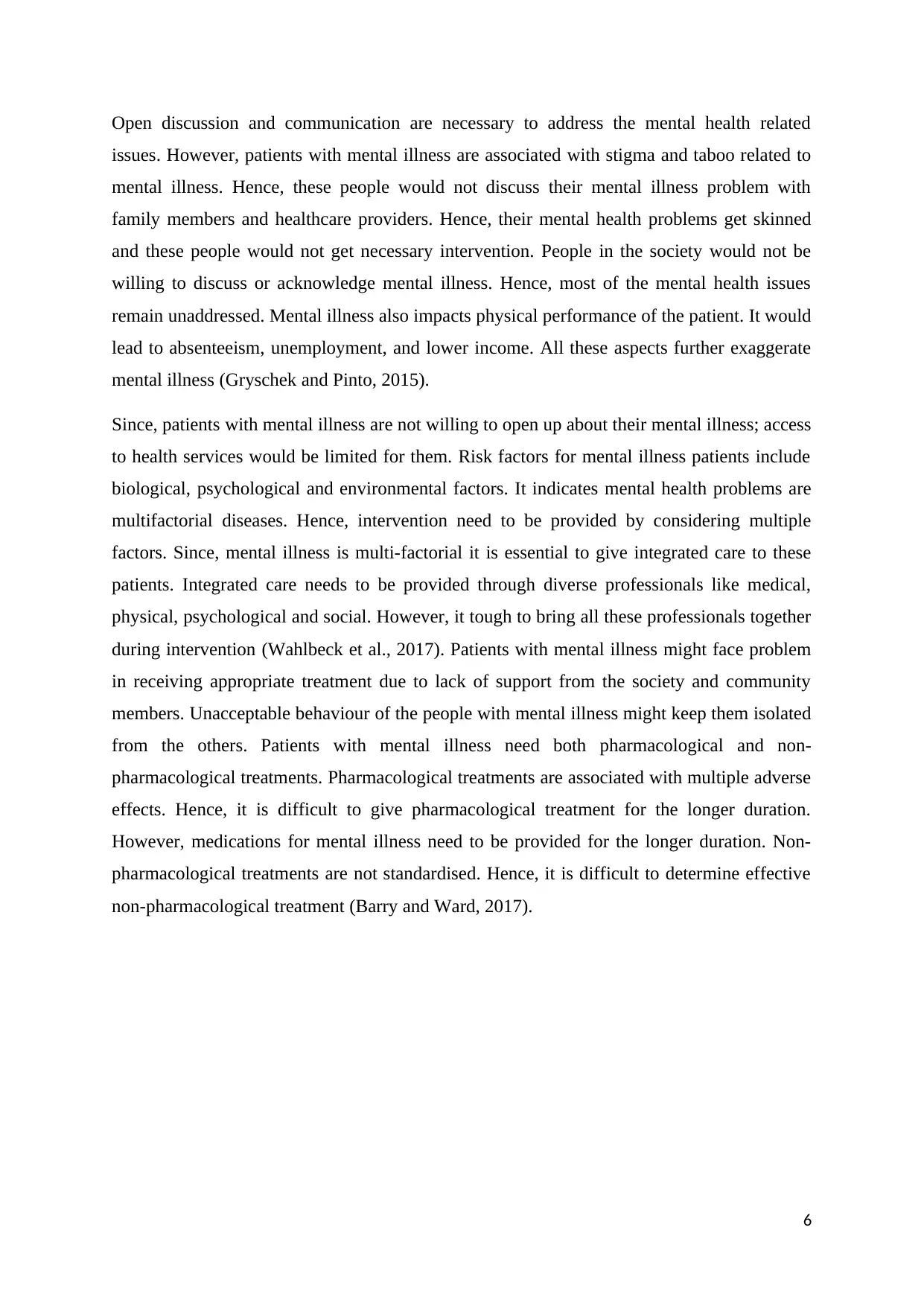
Open discussion and communication are necessary to address the mental health related
issues. However, patients with mental illness are associated with stigma and taboo related to
mental illness. Hence, these people would not discuss their mental illness problem with
family members and healthcare providers. Hence, their mental health problems get skinned
and these people would not get necessary intervention. People in the society would not be
willing to discuss or acknowledge mental illness. Hence, most of the mental health issues
remain unaddressed. Mental illness also impacts physical performance of the patient. It would
lead to absenteeism, unemployment, and lower income. All these aspects further exaggerate
mental illness (Gryschek and Pinto, 2015).
Since, patients with mental illness are not willing to open up about their mental illness; access
to health services would be limited for them. Risk factors for mental illness patients include
biological, psychological and environmental factors. It indicates mental health problems are
multifactorial diseases. Hence, intervention need to be provided by considering multiple
factors. Since, mental illness is multi-factorial it is essential to give integrated care to these
patients. Integrated care needs to be provided through diverse professionals like medical,
physical, psychological and social. However, it tough to bring all these professionals together
during intervention (Wahlbeck et al., 2017). Patients with mental illness might face problem
in receiving appropriate treatment due to lack of support from the society and community
members. Unacceptable behaviour of the people with mental illness might keep them isolated
from the others. Patients with mental illness need both pharmacological and non-
pharmacological treatments. Pharmacological treatments are associated with multiple adverse
effects. Hence, it is difficult to give pharmacological treatment for the longer duration.
However, medications for mental illness need to be provided for the longer duration. Non-
pharmacological treatments are not standardised. Hence, it is difficult to determine effective
non-pharmacological treatment (Barry and Ward, 2017).
6
issues. However, patients with mental illness are associated with stigma and taboo related to
mental illness. Hence, these people would not discuss their mental illness problem with
family members and healthcare providers. Hence, their mental health problems get skinned
and these people would not get necessary intervention. People in the society would not be
willing to discuss or acknowledge mental illness. Hence, most of the mental health issues
remain unaddressed. Mental illness also impacts physical performance of the patient. It would
lead to absenteeism, unemployment, and lower income. All these aspects further exaggerate
mental illness (Gryschek and Pinto, 2015).
Since, patients with mental illness are not willing to open up about their mental illness; access
to health services would be limited for them. Risk factors for mental illness patients include
biological, psychological and environmental factors. It indicates mental health problems are
multifactorial diseases. Hence, intervention need to be provided by considering multiple
factors. Since, mental illness is multi-factorial it is essential to give integrated care to these
patients. Integrated care needs to be provided through diverse professionals like medical,
physical, psychological and social. However, it tough to bring all these professionals together
during intervention (Wahlbeck et al., 2017). Patients with mental illness might face problem
in receiving appropriate treatment due to lack of support from the society and community
members. Unacceptable behaviour of the people with mental illness might keep them isolated
from the others. Patients with mental illness need both pharmacological and non-
pharmacological treatments. Pharmacological treatments are associated with multiple adverse
effects. Hence, it is difficult to give pharmacological treatment for the longer duration.
However, medications for mental illness need to be provided for the longer duration. Non-
pharmacological treatments are not standardised. Hence, it is difficult to determine effective
non-pharmacological treatment (Barry and Ward, 2017).
6
⊘ This is a preview!⊘
Do you want full access?
Subscribe today to unlock all pages.

Trusted by 1+ million students worldwide
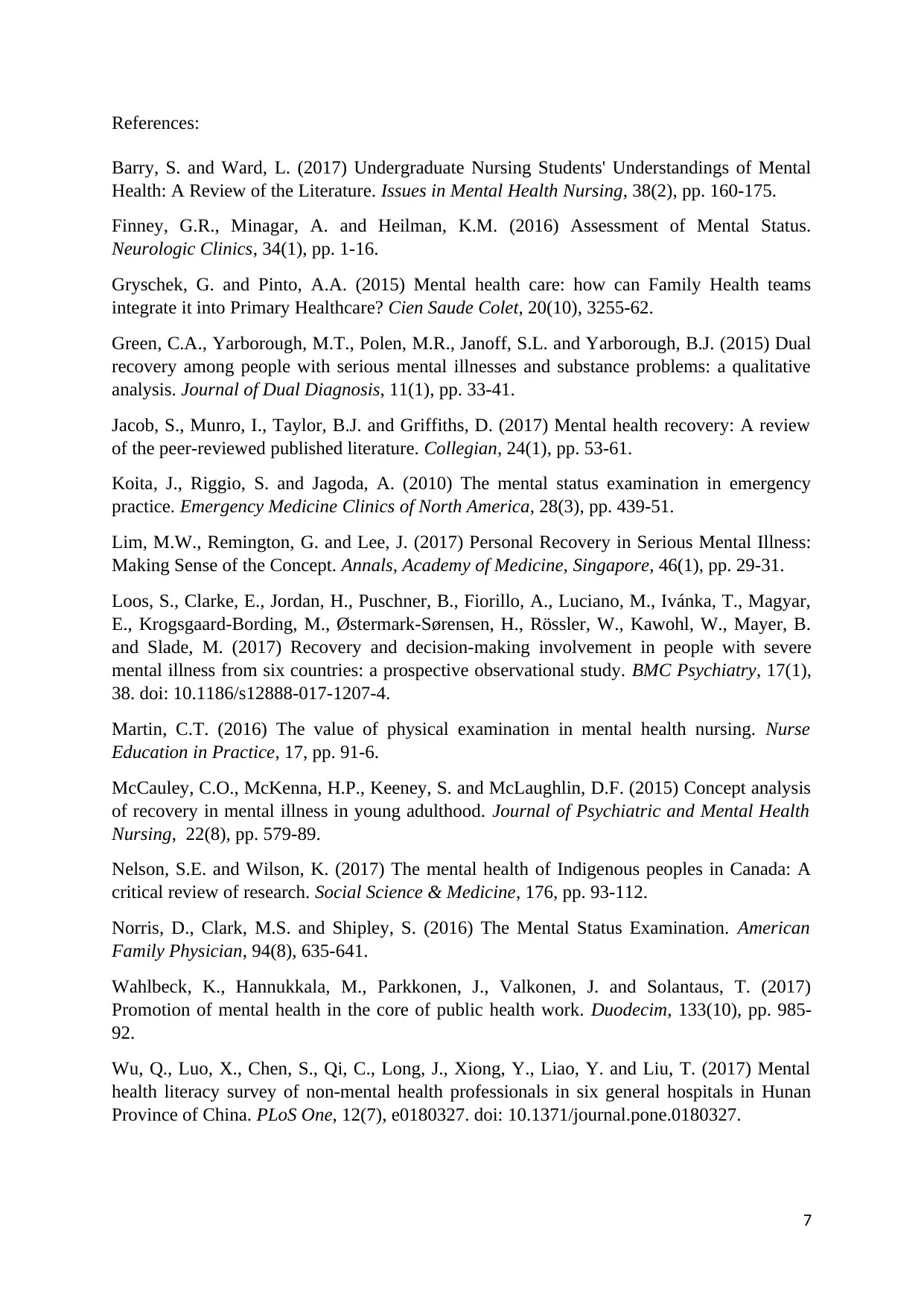
References:
Barry, S. and Ward, L. (2017) Undergraduate Nursing Students' Understandings of Mental
Health: A Review of the Literature. Issues in Mental Health Nursing, 38(2), pp. 160-175.
Finney, G.R., Minagar, A. and Heilman, K.M. (2016) Assessment of Mental Status.
Neurologic Clinics, 34(1), pp. 1-16.
Gryschek, G. and Pinto, A.A. (2015) Mental health care: how can Family Health teams
integrate it into Primary Healthcare? Cien Saude Colet, 20(10), 3255-62.
Green, C.A., Yarborough, M.T., Polen, M.R., Janoff, S.L. and Yarborough, B.J. (2015) Dual
recovery among people with serious mental illnesses and substance problems: a qualitative
analysis. Journal of Dual Diagnosis, 11(1), pp. 33-41.
Jacob, S., Munro, I., Taylor, B.J. and Griffiths, D. (2017) Mental health recovery: A review
of the peer-reviewed published literature. Collegian, 24(1), pp. 53-61.
Koita, J., Riggio, S. and Jagoda, A. (2010) The mental status examination in emergency
practice. Emergency Medicine Clinics of North America, 28(3), pp. 439-51.
Lim, M.W., Remington, G. and Lee, J. (2017) Personal Recovery in Serious Mental Illness:
Making Sense of the Concept. Annals, Academy of Medicine, Singapore, 46(1), pp. 29-31.
Loos, S., Clarke, E., Jordan, H., Puschner, B., Fiorillo, A., Luciano, M., Ivánka, T., Magyar,
E., Krogsgaard-Bording, M., Østermark-Sørensen, H., Rössler, W., Kawohl, W., Mayer, B.
and Slade, M. (2017) Recovery and decision-making involvement in people with severe
mental illness from six countries: a prospective observational study. BMC Psychiatry, 17(1),
38. doi: 10.1186/s12888-017-1207-4.
Martin, C.T. (2016) The value of physical examination in mental health nursing. Nurse
Education in Practice, 17, pp. 91-6.
McCauley, C.O., McKenna, H.P., Keeney, S. and McLaughlin, D.F. (2015) Concept analysis
of recovery in mental illness in young adulthood. Journal of Psychiatric and Mental Health
Nursing, 22(8), pp. 579-89.
Nelson, S.E. and Wilson, K. (2017) The mental health of Indigenous peoples in Canada: A
critical review of research. Social Science & Medicine, 176, pp. 93-112.
Norris, D., Clark, M.S. and Shipley, S. (2016) The Mental Status Examination. American
Family Physician, 94(8), 635-641.
Wahlbeck, K., Hannukkala, M., Parkkonen, J., Valkonen, J. and Solantaus, T. (2017)
Promotion of mental health in the core of public health work. Duodecim, 133(10), pp. 985-
92.
Wu, Q., Luo, X., Chen, S., Qi, C., Long, J., Xiong, Y., Liao, Y. and Liu, T. (2017) Mental
health literacy survey of non-mental health professionals in six general hospitals in Hunan
Province of China. PLoS One, 12(7), e0180327. doi: 10.1371/journal.pone.0180327.
7
Barry, S. and Ward, L. (2017) Undergraduate Nursing Students' Understandings of Mental
Health: A Review of the Literature. Issues in Mental Health Nursing, 38(2), pp. 160-175.
Finney, G.R., Minagar, A. and Heilman, K.M. (2016) Assessment of Mental Status.
Neurologic Clinics, 34(1), pp. 1-16.
Gryschek, G. and Pinto, A.A. (2015) Mental health care: how can Family Health teams
integrate it into Primary Healthcare? Cien Saude Colet, 20(10), 3255-62.
Green, C.A., Yarborough, M.T., Polen, M.R., Janoff, S.L. and Yarborough, B.J. (2015) Dual
recovery among people with serious mental illnesses and substance problems: a qualitative
analysis. Journal of Dual Diagnosis, 11(1), pp. 33-41.
Jacob, S., Munro, I., Taylor, B.J. and Griffiths, D. (2017) Mental health recovery: A review
of the peer-reviewed published literature. Collegian, 24(1), pp. 53-61.
Koita, J., Riggio, S. and Jagoda, A. (2010) The mental status examination in emergency
practice. Emergency Medicine Clinics of North America, 28(3), pp. 439-51.
Lim, M.W., Remington, G. and Lee, J. (2017) Personal Recovery in Serious Mental Illness:
Making Sense of the Concept. Annals, Academy of Medicine, Singapore, 46(1), pp. 29-31.
Loos, S., Clarke, E., Jordan, H., Puschner, B., Fiorillo, A., Luciano, M., Ivánka, T., Magyar,
E., Krogsgaard-Bording, M., Østermark-Sørensen, H., Rössler, W., Kawohl, W., Mayer, B.
and Slade, M. (2017) Recovery and decision-making involvement in people with severe
mental illness from six countries: a prospective observational study. BMC Psychiatry, 17(1),
38. doi: 10.1186/s12888-017-1207-4.
Martin, C.T. (2016) The value of physical examination in mental health nursing. Nurse
Education in Practice, 17, pp. 91-6.
McCauley, C.O., McKenna, H.P., Keeney, S. and McLaughlin, D.F. (2015) Concept analysis
of recovery in mental illness in young adulthood. Journal of Psychiatric and Mental Health
Nursing, 22(8), pp. 579-89.
Nelson, S.E. and Wilson, K. (2017) The mental health of Indigenous peoples in Canada: A
critical review of research. Social Science & Medicine, 176, pp. 93-112.
Norris, D., Clark, M.S. and Shipley, S. (2016) The Mental Status Examination. American
Family Physician, 94(8), 635-641.
Wahlbeck, K., Hannukkala, M., Parkkonen, J., Valkonen, J. and Solantaus, T. (2017)
Promotion of mental health in the core of public health work. Duodecim, 133(10), pp. 985-
92.
Wu, Q., Luo, X., Chen, S., Qi, C., Long, J., Xiong, Y., Liao, Y. and Liu, T. (2017) Mental
health literacy survey of non-mental health professionals in six general hospitals in Hunan
Province of China. PLoS One, 12(7), e0180327. doi: 10.1371/journal.pone.0180327.
7
Paraphrase This Document
Need a fresh take? Get an instant paraphrase of this document with our AI Paraphraser

8
1 out of 8
Related Documents
Your All-in-One AI-Powered Toolkit for Academic Success.
+13062052269
info@desklib.com
Available 24*7 on WhatsApp / Email
![[object Object]](/_next/static/media/star-bottom.7253800d.svg)
Unlock your academic potential
Copyright © 2020–2026 A2Z Services. All Rights Reserved. Developed and managed by ZUCOL.





